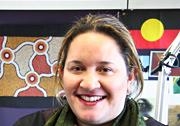A vote for Indigenous rights
Director of UNSW's Indigenous Law Centre, Megan Davis, has welcomed Australia's endorsement of the UN Declaration on the Rights of Indigenous Peoples, describing it as "an historic decision".
Director of UNSW's Indigenous Law Centre, Megan Davis, has welcomed Australia's endorsement of the UN Declaration on the Rights of Indigenous Peoples, describing it as "an historic decision".

Director of UNSW's Indigenous Law Centre, Megan Davis, has welcomed the Australian Government's endorsement of the United Nations Declaration on the Rights of Indigenous Peoples, describing it as "an historic decision" that will improve lives.
Ms Davis, a former United Nations Indigenous Fellow, was one of the Australians who played a central role in the development of the Declaration.
The endorsement reverses the position of the previous government and fulfills a key election promise for the Labor Party.
Australia, along with Canada, New Zealand and the United States, originally voted against the Declaration when it was adopted by the UN General Assembly in September 2007.
A non-binding text, the Declaration sets out the individual and collective rights of Indigenous peoples, as well as their rights to culture, identity, language, employment, health, education and other issues.
Announcing the decision in parliament, Minister for Indigenous Affairs Jenny Macklin paid tribute to Ms Davis and the Indigenous Law Centre alongside other notable Australians including former and current Australians of the Year Lowitja O´Donoghue and Mick Dodson, and Aboriginal and Torres Strait Islander Social Justice Commissioner Tom Calma.
"It was an election policy of the Labor Party to endorse the Declaration and so it's a very timely and historic decision," said Ms Davis, who is also a senior lecturer in the Faculty of Law.
"It has taken over two decades to develop this international instrument, which extensively elaborates upon what the right to self-determination means to Indigenous peoples around the world. Each article reflects a known case of state violation of indigenous human rights.
"Although non-binding in domestic law, it will be used daily by Aboriginal and Torres Strait Islander people in their work with government and the private sector," she said.
Media Contact: Steve Offner | 9385 8107 | s.offner@unsw.edu.au